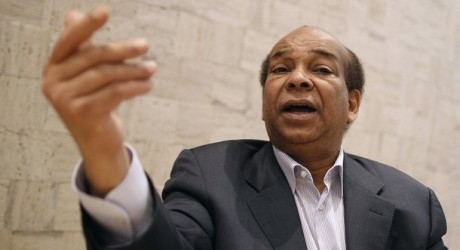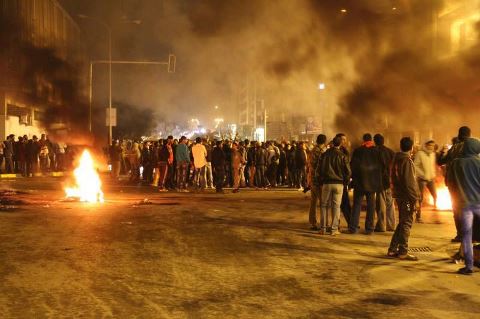By Dr Ismail Suayah.

North Carolina, US, 27 November 2012:
Why would Abdurrahman Shalgham, a diplomat and foreign minister for the tyrannical regime of Muammar . . .[restrict]Qaddafi, continue to serve as Libya’s ambassador to the United Nations? Libya cannot have stability without reconciliation, and so I am at peace with the fact that many Qaddafi regime insiders like Shalgham now lead quiet, comfortable lives in academia or in retirement. But it’s much harder for me to reconcile with the fact that some feel entitled to hold powerful positions in the new Libya. I believe most Libyans share my sentiment towards the former regime insiders.
I visited Libya House, home of Libya’s Mission to the United Nations in New York City, twice since the liberation of Tripoli: first to attend a meeting of the American Libyan community to discuss how to support Libya after the armed conflict ended; and second to celebrate the first anniversary of the 17 February Revolution. The mission staff I met there seemed awkward and out of place. Their bosses, Abdel Rahman Shalgham and his deputy, Ibrahim Dabbashi, were pretentious and self-important. Shalgham and Dabbashi defected from the Qaddafi regime after 17 February, 2011.
By his own admission, Shalgham was a childhood friend of Qaddafi. He served the deposed regime through his entire professional career. According to Wikipedia, Shalgham served as the deposed regime’s ambassador to Italy from 1984 to 1995 and as Libya’s foreign minister from 2000 to 2009 when he became the regime’s representative to UN until his defection. It is widely known that he was one of the regime’s closest and most powerful allies.
Shalgham publically denounced Qaddafi’s actions days after he spoke of his close friendship with the dictator, telling reporters how he could be critical of Qaddafi’s policies but not attack him personally. When Qaddafi ordered forces to open fire on civilian protestors on the wake of 17 February uprising, Shalghum expressed shock and dismay at the UN Security Council, implying he could not believe Qaddafi would do such a thing. For Shalgham, at this late stage in his career, to be surprised by Qaddafi’s brutality is a stretch of the imagination.
In his own writing and in media appearances, Shalgham claims to know about all of Qaddafi’s foreign policy mishaps. Given his nine-year service as foreign minister for the deposed regime, it is difficult to believe that Shalghum was not also instrumental in implementing some of the regime’s policies. Qaddafi could not have ruled Libya for four decades without the loyalty of servants like Shalgham.
On his first visit to Libya in 2004 after twenty seven years in exile, a fellow Libyan-American and human rights activist, Fathi Omar Turbi, appealed to Shalgam and other Libyan ministers to allow Libyans in exile safe entry to Libya. Turbi recalls that Shalghum disdainfully refused to facilitate entry or guarantee safety to any Libyan living in exile. Instead, he stood up from behind his desk, leaned forward and said “Turbi, I am a true Machiavellian, and I eat my enemy for lunch before my enemy has me for dinner.”
“The fact that Abdurrahman Shalgham and Ali Aujali (Libya’s current ambassador to the US and nominee for the foreign minister post in the new Zaidan government) are representing the new Libya in their respective diplomatic posts is a real travesty,” says Turbi. Turbi’s sentiment is shared by nearly all Libyans with whom I have been in contact since the fall of the deposed regime. My own encounters with Shalgham in Libya House left me with the impression that he is an opportunist who abandoned Qaddafi’s sinking ship to save his own life. Shalgham’s self-description of himself to Turbi as Machiavellian appears to be not far from the truth.
When he sided with the revolution after 17 February 2011, Shalgham told the media that a son who was trapped inside Libya during his defection is to be considered a martyr. Whether he told the truth is difficult to prove. His son apparently was never harmed. When I inquired about the whereabouts of Shalgham’s son during his father’s defection, several Libyans told me the son was indeed in Libya then and that he hid until it was safe for him to leave the country.
Ever since Shalgham switched sides, he’s been enjoying the media spotlight telling stories about the regime in which he served as close confidant to its figurehead. Now that he is on the side of the revolution, he is pretending to fight for the free people of Libya but his approach is anything but diplomatic. His recent attacks on the state of Qatar for its alleged political interference in post-Qaddafi Libya is unprofessional and frankly rather embarrassing for a man who spent his professional career serving as diplomat and foreign minister.
After enduring four decades of brutal oppression by the Qaddafi regime, the Libyan people are having difficulty accepting the ousted regime insiders in high-profile government positions, yet some insiders continue to serve in important positions. Shalgham remains in his post as Libya’s ambassador to the UN and while on the job he has been occupied with writing books.
Knowing how consuming the process of book writing is, one is left to wonder how Shalgham can manage to write books while performing his responsibilities at a time of a difficult transition. Shouldn’t he spend his time seeking help with sensitive matters of interest to Libya like human rights, unexploded ordinance and border security?
With so many educated, idealistic Libyans eager to serve their country, it seems our nation’s precious resources could be better spent than supporting Shalgham’s writing hobby and self-promoting media appearances.
Dr Suayah is a former geo-marine scientist, currently working in the software industry. He lives in the United States in the state of North Carolina with his wife and two children.
The views expressed in Opinion articles do not necessarily reflect those of the Libya Herald.
[/restrict]





